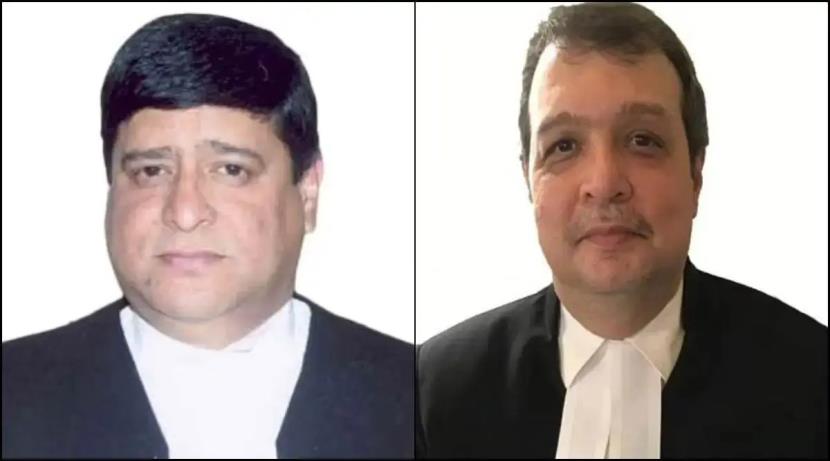NEW DELHI :The Central government on Saturday notified the appointments of Gauhati High Court Chief Justice Sudhanshu Dhulia and Gujarat High Court judge Justice Jamshed Burjor Pardiwala, as the judges of the Supreme Court.
“In exercise of the powers conferred by clause (2) of Article 124 of the Constitution of India, the President is pleased to appoint Justice Sudhanshu Dhulia, Chief Justice of the Gauhati High Court, to be a Judge of the Supreme Court of India with effect from the date he assumes charge of his office,” the notification said.
A similar notification was issued for the appointment of Justice Pardiwala.
Supreme Court Collegium led by Chief Justice of India NV Ramana on May 4 recommended to the Centre the elevation of Justices Dhulia and Pardiwala, for appointment as top court judges.
Justice Dhulia will be the second Judge to be elevated from Uttarakhand High Court. Justice Dhulia hails from Madanpur, a remote village located in the Pauri Garhwal district of Uttarakhand.
His paternal grandfather Bhairav Dutt Dhulia was a freedom fighter and was sentenced to seven years in jail for his participation in the ‘Quit India Movement’ (he served a jail sentence for about three years, before he was released, along with other freedom fighters). He was a Sanskrit scholar and an Ayurvedacharya.
His father Justice Keshev Chandra Dhuliya was a Judge at Allahabad High Court. Justice Dhulia has two brothers. His elder brother Himanshu Dhulia is a retired Naval Officer and the younger, Tigmanshu Dhulia, is a national award-winning film director.
Justice Dhulia was born on August 10, 1960, in Lansdowne, Pauri Garhwal and had his early education in Dehradun and Allahabad. He is an Alumni of Sainik School, Lucknow and did his graduation and Law from the University of Allahabad. He was a keen debater and a sportsman in school and college days.
He was the first Chief Standing Counsel in the High Court of Uttarakhand and was later an Additional Advocate General for the State of Uttarakhand.
He was designated as a senior advocate in 2004. He was elevated as the judge of the High Court of Uttarakhand in November 2008 and later became the Chief Justice of the High Court of Assam, Mizoram, Nagaland and Arunachal Pradesh on January 10, 2021.
Justice Pardiwala will be the fourth Parsi to adorn the bench of the Supreme Court. He will have a tenure of about two years and three months as Chief Justice of India. The elevation of a Judge from a minority community is happening after a gap of five years. Justice S Abdul Nazeer was elevated to Supreme Court in February 2017.
Justice Pardiwala was born on August 12, 1965, in Mumbai and did his schooling in St. Joseph Convent School in his home town Valsad (South Gujarat). He graduated from the J P Arts College, Valsad. He went on to obtain a degree in Law from the KM Mulji Law College, Valsad in 1988.
Justice Pardiwala is a fourth-generation legal professional in the family of lawyers. His father late Burjor Cawasji Pardiwala practised law for 52 years in the districts of Valsad and Navsari. He had also served as the Speaker of the 7th Legislative Assembly of Gujarat for a brief while. His grandfather and great grandfather were also lawyers and practiced in the districts of Valsad and Navsari.
Justice Pardiwala started practising law in the High Court of Gujarat in the year 1990. He was elected as a member of the Bar Council of Gujarat in the year 1994.
He was appointed as the Standing Counsel for the High Court of Gujarat in the year 2002 and held the office till the date of his elevation to the bench on February 17, 2011.
CJI Justice Ramana could evolve a consensus in the five-judge Collegium to unanimously recommend a record number of 11 names so far, since August last year.
It may be recalled that 9 of them, including 3 women, were administered oath as Judges of the Supreme Court on August 31, 2021, by CJI Ramana.
The same collegium consisting of CJI Ramana, Justices UU Lalit, AM Khanwilkar, DY Chandrachud and L Nageswara Rao also recommended the appointment of 10 new Chief Justices to various High Courts.
The Collegium of top three judges recommended so far 180 names for appointment as judges of various High Courts.
